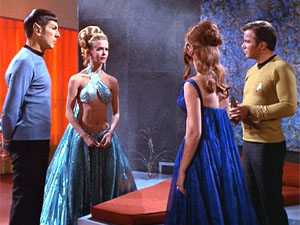 “The Cloud Minders” is another anvilicious episode along the lines of “Let That be Your Last Battlefield”. The moral here is again anti-prejudice and discrimination, played out between an elite ruling class and a lowly working class. Literally lowly, in an almost painful piece of symbolism, as the rulers live in the beautiful cloud city of Stratos, while the workers (called Troglytes) toil in the mines on the surface of the planet Ardana.
“The Cloud Minders” is another anvilicious episode along the lines of “Let That be Your Last Battlefield”. The moral here is again anti-prejudice and discrimination, played out between an elite ruling class and a lowly working class. Literally lowly, in an almost painful piece of symbolism, as the rulers live in the beautiful cloud city of Stratos, while the workers (called Troglytes) toil in the mines on the surface of the planet Ardana.
The Enterprise is there to collect supplies of the mineral zenite, which is the only cure for a plague threatening to wipe out all vegetation on some other planet. Kirk and Spock ignore the Ardanian request to beam down to their clod city, and instead go to the mines, where they are attacked by disgruntled Troglytes led by Vanna, who Spock gets to fight in a rare case of the crew fighting hand to hand with a woman. The High Advisor of Ardana, Plasus, rescues Kirk and Spock with a security team and takes them up to the safety of the city, which is all crystal spires and togas, setting up the urban segregation of this crapsaccharine world.
Here they meet Plasus’ daughter, Droxine, who wears a startlingly revealing light blue outfit that has Spock going google-eyed in a most out-of-character way, complete with some cringeworthy flirting dialogue. There’s some revelation of the plight of the Troglytes and bigoted dismissal of concern by Plasus, leading to a persecuted Troglyte jumping off the city and plummeting to his death. Spock goes all introspective, weighing up the beauty of Droxine against the ugliness of the society she inhabits. There’s even a Gilligan cut of Plasus assuring Kirk there is no violence in their society, followed by a shot of him torturing a captured Troglyte.
There’s a subplot about the Troglytes being exposed to an intelligence reducing gas from the zenite mines, which is part of the justification the cloud dwellers use for persecuting them. Kirk deals with Vanna, offering her gas masks to allow the Troglytes to grow to their full potential. Plasus is naturally opposed and there’s a standoff in the mines and all the drama and action basically happens crammed into the last 5 minutes of the episode, where it feels very rushed. Phew…
It’s a pretty lame episode. The moral is worthy, but it’s heavy-handed, and developed in annoying ways. Spock’s character is almost completely subverted as he basically turns into a lovestruck moron. Kirk interferes with a Federation member’s government with impunity. The plot idea is actually kind of good, but it’s not treated right.
Tropes: Anvilicious, Unobtainium, The Plague, Would Hit A Girl, Crystal Spires And Togas, Urban Segregation, Crapsaccharine World, The President’s Daughter, Theiss Titillation Theory, Character Derailment, Gilligan Cut, Agony Beam, Screw The Rules, I’m Doing What’s Right.
Body count: One Troglyte (suicide by jumping from Stratos).

“Clod city”? Best typo ever.
You know, reading through these reviews, I had the most amusing thought:
“What if everyone on the enterprise except the main characters is a scientific specialist?”
It could be easily handwaved by saying science is so advanced and diverse in the future, you really need an entire ship of scientists to represent all the basic knowledge of the major fields. But it would explain why the security sucks (it consists of the local space fungus gastronomy, tertiary quantum fluctuations of the neutron flow and warriors of the 17th century specialists) and it could explain why the main characters are always on the missions (they are the only ones who have a general wide field of knowledge, instead of an incredibly specific).
One thing I will point out about shows like this and “Let This Be Your Last Battlefield”, the U.S.A. was going through the end of the 1950s-1960s Civil Rights struggle, Martin Luther King, and Robert Kennedy were both recently assassinated. Shows like this were a way for Hollywood to comment on the destructiveness of racial prejudice and segregation in ways that were rarely censored by either the networks, or the local broadcast stations, as such were often used to make Anvilicious Points.
A. David: Sure, I recognise there’s a context for it and a reason why the story was written. It’s still pretty heavy-handed and obvious.
Heavy-handed and obvious? Indeed. But not so much when they were first broadcast, as I remember from back then. Pretty shocking almost…